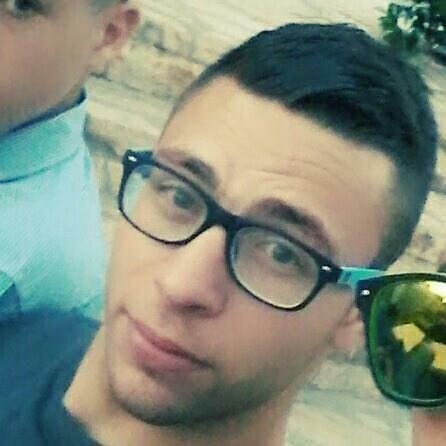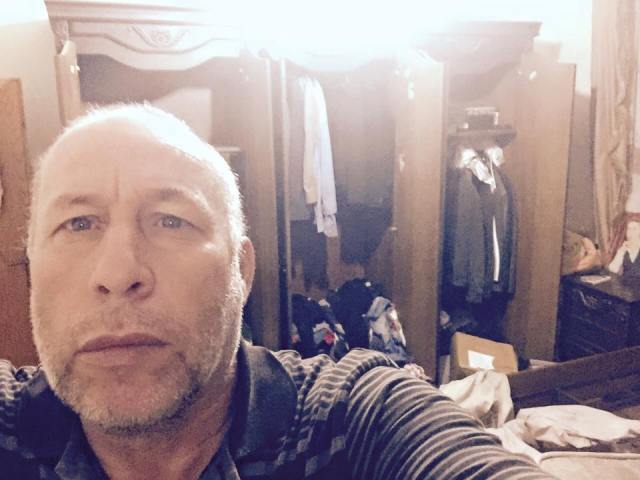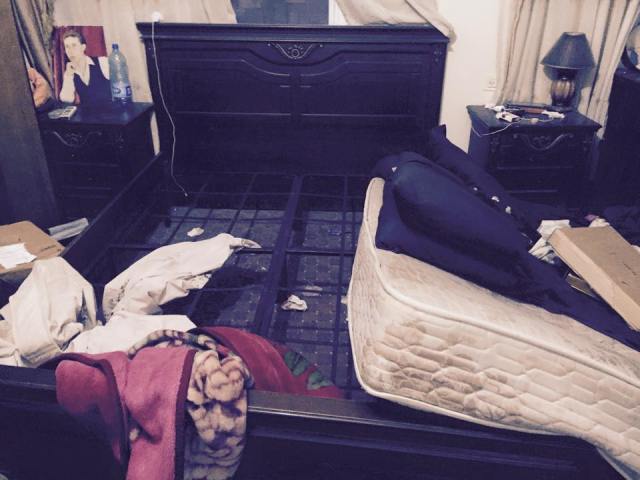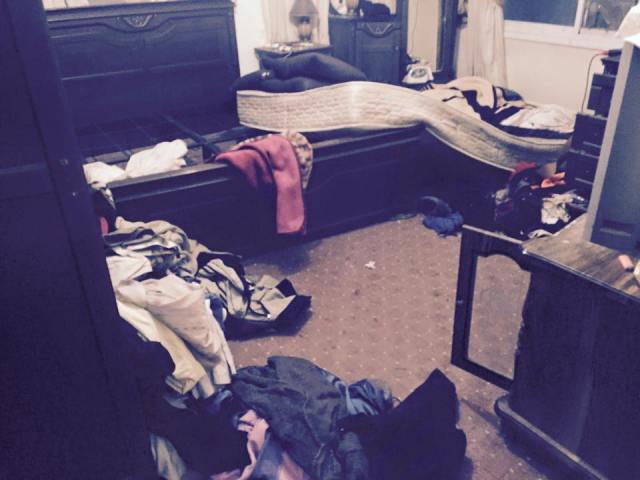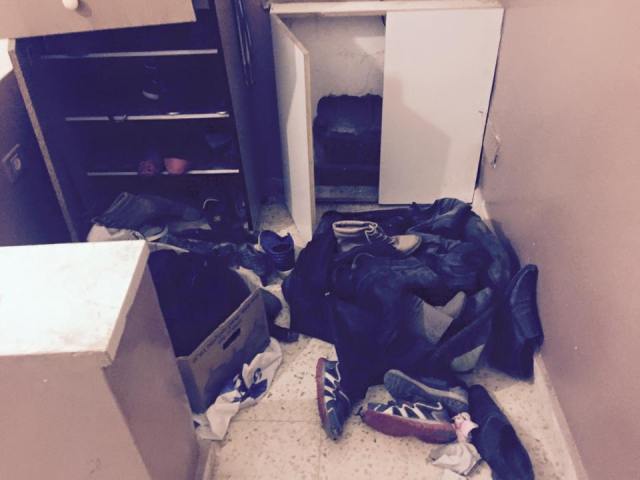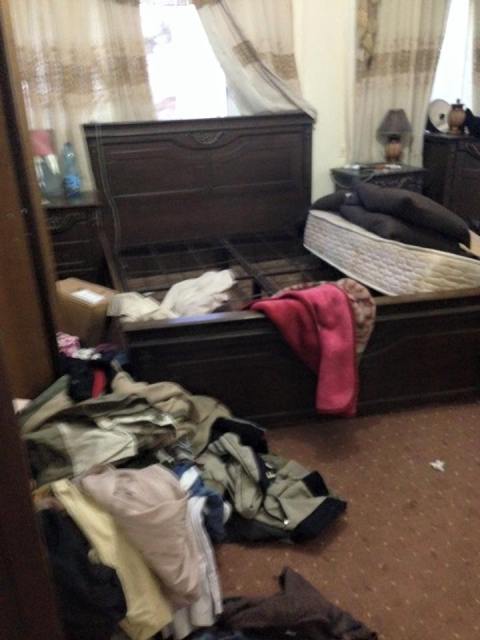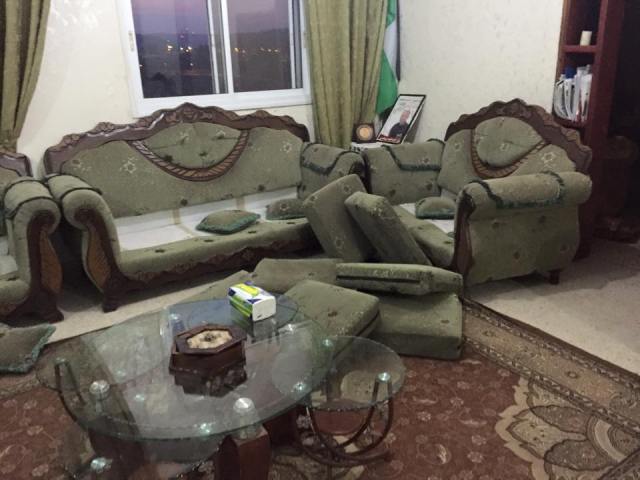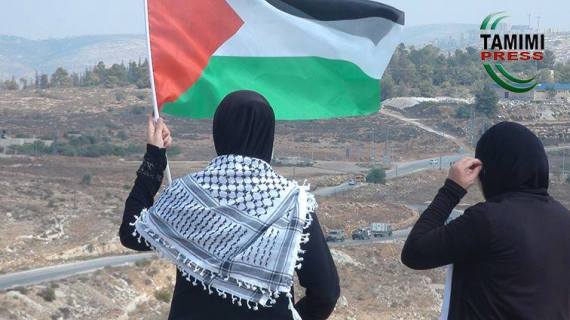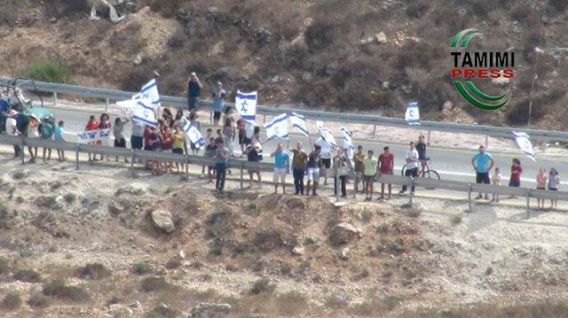“As-salamu alaykum,” Bassem Tamimi began. “Peace be upon you.”
Around 100 New Yorkers squeezed into a The New School lecture room on the evening of September 15. They were there to listen to the veteran Palestinian activist speak about life under occupation, and the nonviolent resistance he helps lead against that occupation.
Tamimi overtured his talk with videos of the weekly protests in his village Nabi Saleh, including the viral video depicting an Israeli soldier trying to arrest a young child whose arm is in a sling, while Palestinian women wrestle the boy free.
He explained that it was his family in those videos. “My suffering and my family’s suffering is an example of the Palestinian suffering and the occupation,” Tamimi said.
Tamimi told the rapt audience in detail what life is like behind that camera, what Palestinians withstand under occupation.
Israeli forces killed Tamimi’s brother-in-law in front of both him and his wife. He showed the audience a chilling video of 28-year-old Rushdi Tamimi as he lay dying.
As a leader of the nonviolent Palestinian resistance movement, Bassem Tamimi is frequently targeted by Israeli occupation forces. He has been arrested nine times, often in administrative detentions, in which the Israeli government imprisons him without charge or trial.
A recent arrest garnered international attention. Tamimi told of a Palestinian child at a protest who was arrested and detained by Israeli soldiers, who accused him of throwing stones. Up for over a day without sleep, the boy was subjected to 12 hours of interrogation. When the soldiers asked the child who organized the demonstration, he named Bassem. As a result, Tamimi was charged with encouraging children to throw rocks and was imprisoned for 14 months, put on house arrest, and hit with a large fine.
The European Union delegation to the United Nations said it was “very concerned” about the conviction. “The EU considers Bassem Tamimi to be a ‘human rights defender’ committed to non-violent protest against the expansion of an Israeli settlement on lands belonging to his West Bank village of Nabi Saleh,” it asserted. Amnesty International stood behind Tamimi, whom it described as a “prisoner of conscience.”
In the many months he has languished in prison, Tamimi has endured torture. Recalling one of his arrests, Tamimi described being isolated in a small cell, where he was tortured for over a month. The torment ended in a 10-day coma, and he recalled being paralyzed for a period of time after waking up.
His family members, many of whom are also leaders in the struggle, have made similar sacrifices. Nariman Tamimi, Bassem’s wife, has herself been arrested five times. Israeli soldiers have shot her twice. She has been unable to walk without crutches since being shot in the leg in November.
Tamimi’s oldest son was arrested at 14. Another of his children was shot in the hand.

“All of this is part of our suffering,” Bassem Tamimi insists. With each act of individual hardship, he connects it to a larger, collective Palestinian suffering.
Occupation
Nabi Saleh is a small village in the central West Bank, near Ramallah, with just 600 residents. 60% of the community’s land is controlled by an Israeli settlement.
Inhabitants of the village live under Israeli military occupation. Israeli forces have closed off the village from all directions, Tamimi explained. In 2001, a settlement gate was constructed approximately 100 meters away from Tamimi’s house. Because of the obstruction, it now takes him hours to reach home.
Under the Oslo II Accord, the majority of land in the West Bank is designated Area C, and is under full control of the Israeli government. There “is a silent ethnic cleansing in Area C,” Tamimi remarked. Yet he insisted Israel’s “goal is not just ethnic cleansing in Area C; it’s also to destroy the shape of the Palestinian villages,” disturbing Palestinian “social relations.”
80% of Palestinians’ homes in Nabi Saleh are under demolition order, including Tamimi’s. “We don’t know if they will demolish our houses, but they keep us under the stress that one day or night they will come and destroy the houses,” he said.
Israel controls 90% of Palestinian water resources, distributing it through the state-owned water company Mekorot. In Nabi Saleh, Palestinians must permanently ration their water. They are limited to a certain amount every week, which they store in tanks on the roofs of their homes.
Israelis, however, shoot the tanks with live ammunition, Tamimi explained, putting holes in the containers so they are unable to store water. Occupation forces also spray skunk water on the tanks, which contaminates the water, making them useless.
Skunk water is a non-lethal chemical weapon the Israeli military uses against Palestinians. It leaves an intense mephitic stench on whatever it hits. BBC described the smell as “the worst, most foul thing you have ever smelled. An overpowering mix of rotting meat, old socks that haven’t been washed for weeks—topped off with the pungent waft of an open sewer.” Reuters wrote “Imagine taking a chunk of rotting corpse from a stagnant sewer, placing it in a blender and spraying the filthy liquid in your face. Your gag reflex goes off the charts and you can’t escape, because the nauseating stench persists for days.”
“They use it every Friday, and they come and spray it in the houses,” Tamimi said. While shooting the weapon inside of Palestinians’ homes, Israeli occupation forces sometimes break windows, he described. Palestinians’ furniture is also frequently ruined in the attacks. “A lot of people burn their furniture,” Tamimi added.
Nariman, Bassem’s wife, was hit with skunk water sprayed by Israeli soldiers. “It remained in her hair for two or three weeks” recalled Tamimi.
Repression
More than 300 people have been injured in Nabi Saleh, 40% of whom are children, according to Tamimi. Around 50 have permanent disabilities. Tamimi told of a man in the village who was shot in the face with a tear gas canister, and now has brain damage.
Occupation forces have recently begun using live 20mm bullets, Tamimi said, with which they shoot protesting Palestinians, including children, in the leg, in order to paralyze them. 70% of those who have been shot in their leg have had their foot paralyzed. Three women have been shot in the leg, including Tamimi’s wife, who now must walk on crutches.
Palestinian property is also a common target. Tamimi said Israelis have tried to burn his house down twice, while he and his family were in it, but they woke up at night and stopped it.
More than 400 olive trees have additionally been broken, uprooted, or burned in Nabi Saleh. “We are an agricultural society,” Tamimi stated. “Olive trees are like our mothers… When they cut and burn the olive trees, for that we feel they kill a member of our family.”
In the 46 years from the beginning of Israel’s illegal military occupation in 1967 to October 2013, Israeli authorities uprooted 800,000 Palestinian olive trees, the equivalent of 33 of New York City’s Central Park. This results in an annual loss of $12.3 million in income to 80,000 Palestinian families.

Tamimi says Israeli soldiers also target women. “They know the woman participant is a problem,” he explained. So “they shoot them, they arrest them, and they remove their head covers.”
Women play a crucial role in the Palestinian struggle. “We believe real resistance means women must participate,” stated Tamimi. He stressed the importance of feminism in the larger liberation struggle. “We believe the role of the women is more important than the men, because if we want to grow the generation… who will liberate Palestine, we must have free women,” he added.
Nonviolent Struggle
In spite of the violent repression Palestinians endure under the illegal Israeli occupation, Tamimi spoke strongly of “nonviolent struggle,” which he argued is the best, most effective way to resist.
The September 11 attacks “destroyed our image,” Tamimi lamented. “To rebuild the image we must do something; we can’t just talk.” He said in Nabi Saleh and in other villages they study Martin Luther King, Jr., the South African struggle, and other nonviolent liberation movements.
“We want to create a Palestinian model of nonviolent resistance,” Tamimi explained. He sees the First Intifada of the late 1980s as the basis for his model. “Yes, we have right to resist by any means in international law,” Tamimi acknowledged, but he argued that armed resistance will not work against a state that has scores of nuclear weapons, receives over $3 billion in military aid from the US every year, and is backed by NATO.
He spoke critically of not just Israeli occupation, but of British occupation as well. Palestinians have been practicing resistance “since the British occupation, or the Turkish before,” Tamimi declared. “We are against occupation as an idea… because occupation is [against] humanity.”
Today, in occupied Palestine, “our problem is ‘the colonial project’ of Zionism,” he specified. “Our weapon is the camera.”
The Tamimi family have a YouTube channel to which they upload videos of their regular protests. The viral video of the injured young boy pinned down by an Israeli soldier is just one of hundreds.
Asked about what happened to his family in the wake of the video going viral, Tamimi noted they have received numerous death threats. Moreover, Israeli Minister of Culture and Sport Miri Regev asserted that the Israeli soldier should have shot the unarmed Palestinian protesters.
The soldier in the video was banned from Nabi Saleh for a week. Tamimi joked that the man will likely spend his time off on the beach. Meanwhile, Tamimi says soldiers have cracked down even harder, and have arrested six peaceful protesters in the village since the video was released.
Tamimi is not perturbed. “Resistance is not an act; it’s a culture,” he maintained. “We want to make a culture of resistance in our society.”
Economic Interests
Tamimi pointed out that the Israeli occupation is not just based on physical and military oppression; it is also rooted in economic imperialism.
Israel extracts large amounts of money from Palestinians through its exorbitant and frequent fines, he explained. Israeli occupation forces regularly charge Palestinians on trumped-up charges, and, if you don’t pay the fines, Tamimi said, for each 5,000 shekels (roughly $1,300 USD) you will be imprisoned for a month.
An activist in the audience asked whether Palestinians ever refuse to pay the fines, like anti-war tax resisters in the US. “In the First Intifada we refused, because all of the society was,” Tamimi recalled. But it is no longer easy to do so today, when it is not a collective act. “It’s a very hard decision for us, to pay or not to pay,” he revealed.
Tamimi was deeply suspicious of the notion that Israel and its legal institutions are impartial and democratic. Having for decades been subjugated by its various institutions, he knows how they operate. “The court for me is part of the occupation,” Tamimi explained. “It’s just make up for the occupation face.”
In Tamimi’s view, the Palestinian Authority (PA) is part and parcel of this larger system of economic imperialism as well. Palestinians pay taxes to the PA, he expounded, “and most of the goods we buy come through the Israeli economy.” In other words, the PA helps ensure Israel will always have a captive market for its goods. And “the added value tax goes to the Israeli” government,” he said.
The PA are the “shoulder” of the occupation, Tamimi insisted, along with the international community, which, by providing aid to Palestinians living under occupation, help remove the burden for Israel. “Part of our challenge is the Authority,” he said. “Sometimes people can’t distinguish between the two systems.”
Palestinians in the West Bank protest against the PA for its collaboration with Israeli occupation forces.
Israel’s supporters often mention that PA leader Mahmoud Abbas (also known as Abu Mazen) is notoriously corrupt, and they do have a point. Rumors have long circulated that Abbas and his family have siphoned millions of dollars from their impoverished and occupied people. Palestinian scholar Edward Said strongly criticized Abbas, whom he characterized as “a ventriloquist’s puppet.” Tamimi’s and Said’s observations are corroborated by classified cables released by WikiLeaks, which show that Israel intentionally simultaneously exploits the PA and Abbas while blaming them for the problems it itself creates.
Overall, “capitalism is the problem,” Tamimi stressed several times. He spoke of Israel as not some uniquely violent state, but rather as a part of a larger US-dominated capitalist and imperialist system. The US “military industry needs Israel for its interest,” Tamimi maintained.
He reminded the audience less than 2% of the world’s richest people own over half of global wealth, and connected the struggle in his country to the global struggle against capitalism and imperialism.
“They don’t guard Israel because it’s Israel,” Tamimi emphasized, referring to the US. Israel is “a guard for the markets and the resources. A guard for the military industry.”
“They’re a big military base for America,” Tamimi added.
One-State Solution
Tamimi also excoriated the formal so-called peace process. “We believe the negotiations will not” lead to peace, he said. Tamimi pointed out that, since the Oslo Accords, Palestinians have lost more and more land, while the settlements have grown five times over.
The PA opposes the nonviolent civil disobedience movement led by Tamimi et al., because it seeks to negotiate with Israel. The PA’s negotiations simply serve “to cheat everyone,” Tamimi insisted, and all they have done is “destroy the two-state solution.”
In his view, Israel, the PA, and the so-called peace process “destroyed the two-state solution. There is no possibility for the two-state solution,” Tamimi maintained.
Prime Minister Netanyahu was elected in March in Israel for a fourth term. His reelection was predicated on his explicit promise that there would never be an independent Palestinian state. “Netanyahu by his policy gives us a gift, because he shows the real face of Israel,” Tamimi stated. “They don’t want peace; they want everything.”

“If we really want a humanitarian solution, it must be the one state solution, same rights for everyone,” Tamimi proposed. He looked to “the South African model” as a resolution for the conflict in Israel-Palestine, stating “we need to live in a state with one person, one vote, with the same rights.”
And a one-state solution is not enough if it does not include the Right of Return, he insisted. “The right for refugees to return is the main issue in the Palestinian struggle.”
He is not optimistic, nevertheless. “Israeli society goes to the right, not the left; this is a problem,” remarked Tamimi, referring to the growing far-right and ultra-nationalist tendencies of Israeli politics. Because of this rightward lurch, he said “we are afraid that they maybe make another Nakba for the Palestinians.” For this reason, he looks to international pressure, solidarity, and action.
Action
In order to achieve this justice, Tamimi stressed that the world is not going to be able to count on elites. “It will not come through a conference or a workshop,” he said, in stead emphasizing that it must be done by the masses, through activism.
“We have the highest percent of education in Palestine” Tamimi said proudly. A schoolteacher, he stressed the importance of education, and took pride in the fact that the Palestinians, in spite of the grueling oppression under which they live, are some of the most educated people in the world.
Yet he stressed that education is not enough, nor is emotion. Palestinians have succeeded in inspiring others to feel emotion about their suffering, Tamimi said, “but your emotion is not enough. We have enough tears from the tear gas.”
“We need your emotion to be opinion and your opinion to be action,” Tamimi stated. “You can do a lot,” he told the audience. “And it is your duty and your responsibility.”
“The BDS movement is a very important tool in your hands,” Tamimi told the audience. He said international pressure is needed—economic pressure through BDS, political pressure through activism, and legal pressure through international institutions.
Tamimi called for international and interfaith solidarity, emphasizing that this “is not a religious conflict.” “As our land is occupied, the Jewish religion is occupied by the Zionists,” he stated, because Jews around the world are forced defend their religion while Israel commits crimes in its name.
“We live together,” as Muslims, Christians, and Jews. “If tomorrow Netanyahu became a Muslim and declared an Islamic state I would continue fighting,” Tamimi said to laughs from the audience.
Speaking of the struggles against racism in the US and the fight against apartheid in South Africa, Tamimi insisted “It’s the same struggle.” “We follow the Black struggle” in Palestine, he said. He pointed out that, during civil rights protests in Ferguson, Palestinians gave advice to Black Americans on how to deal with police tear gas.

“The colonial project is a problem for humanity.” Anyone who believes that is an ally, he said.
Tamimi admitted it was at first hard to welcome Israelis into his home, because he had not known any anti-Zionist Israelis. But when he met leftist Israelis who opposed the occupation, Tamimi said he welcomed them like family. “When I see them remove the occupation from their mentality” and defy Zionism, “they win their humanity; they became my partner, our cousin,” Tamimi said.
After Tamimi’s speech, a friend of the veteran Palestinian activist stood up and spoke. He explained that when he and other solidarity activists first met Bassem Tamimi, “we were amazed that this man did not have hatred, that he was not motivated by hatred, that he was motivated by love, and freedom, and justice.” We saw that “he was a true revolutionary, like what Che Guevara described,” the man added, one who “is guided by a great feeling of love.”
“We are with humanity,” Tamimi said. “We are against the oppression of anybody. We are against occupation.”




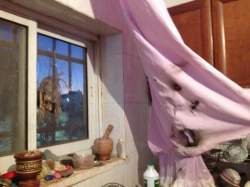

 Members of the Tamimi family prevent an Israeli soldier from arresting Muhammad Tamimi, 12, during the weekly protest against the occupation in the West Bank village of Nabi Saleh on 28 August. Muhannad Saleem ActiveStills
Members of the Tamimi family prevent an Israeli soldier from arresting Muhammad Tamimi, 12, during the weekly protest against the occupation in the West Bank village of Nabi Saleh on 28 August. Muhannad Saleem ActiveStills Palestinians face Israeli soldiers during the weekly protest in Nabi Saleh village in 2011. Anne Paq ActiveStills
Palestinians face Israeli soldiers during the weekly protest in Nabi Saleh village in 2011. Anne Paq ActiveStills Palestinian youths from the West Bank village of Nabi Saleh during a hearing at Ofer military court on 21 December. Oren Ziv ActiveStills
Palestinian youths from the West Bank village of Nabi Saleh during a hearing at Ofer military court on 21 December. Oren Ziv ActiveStills